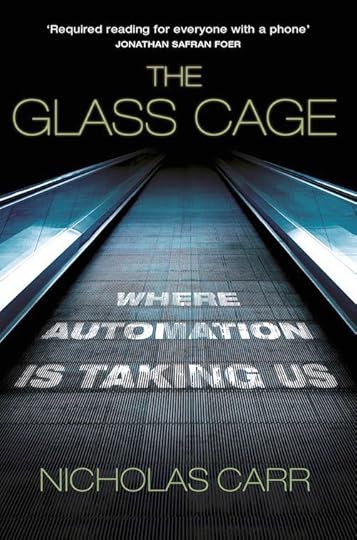Nicholas Carr's Blog, page 24
January 28, 2015
An ear for an ear
In Vocal Apparitions, Michal Grover-Friedlander describesthe origins of ourmodern communication network:
In 1874 Alexander Bell invented the first model of a phone receiver using an ear membrane taken from a human corpse’s ear. The first telephone receiver was, in fact, a human ear, a machine that transmitted a living human voice by way of a dead human’s ear.
“The words of a dead man,” wrote W. H. Auden, “Are modified in the guts of the living.” The reverse, it would seem, is also true.
Image: S...
January 27, 2015
Maps, mind and memory
In concert with the UK publication of The Glass Cage, Penguin Books’ Think Smarter siteis runningan article by me on satellite navigation. Titled “Welcome to Nowheresville,” it’s adapted from a chapter in the book called “World and Screen.” Here’s a taste of the piece:
A GPS device, by allowing us to get from point A to point B with the least possible effort and nuisance, can make our lives easier. But what it steals from us, when we turn to it too often, is the joy and satisfaction of apprehe...
January 26, 2015
Jonathan Swift’s smartphone
Evolution has engineered us for social interaction. Our bodies are instruments exquisitelytuned for tracking and measuringthe auras of others. In quantifying ourselves, therefore, we also quantify those around us. This is the insight that underpins the brilliant new iPhone app pplkpr.
Connected to a sensor-equipped smartwristband, pplkpr takes biometric readings of how interactions with your Facebook friends, in person or screen-mediated, affect your physical and emotional state. pplkpr tells...
January 23, 2015
The alchemist’s delusion
Perhaps it was the altitude, but Eric Schmidt really outdid himself yesterday at Davos:
I say this with almost complete seriousness. Almost all of the problems we debate can be solved literally with more broadband connectivity in these countries. And the reason is, broadband is how you address the governance issues, the information issues, the education issues, the personal security issues, the human rights issues, the women’s empowerment issues.
Call it the alchemist’s delusion. Langdon Winner...
January 21, 2015
From Davos Man to Davos Bot?
In an age of robotic decision-making, are CEOs necessary? It’s a question that needs to be asked, and Frank Pasquale is asking it:
When BART workers went on strike, Silicon Valley worthies threatened to replace them with robots. But one could just as easily call for the venture capitalists to be replaced with algorithms. Indeed, one venture capital firmadded an algorithm to its boardin 2013. Travis Kalanick, the CEO of Uber, responded to a question on driver wage demands by bringing up thepros...
From Davos Man to Davos Robot
In an age of robotic decision-making, are CEOs necessary? It’s a question that needs to be asked, and Frank Pasquale is asking it:
When BART workers went on strike, Silicon Valley worthies threatened to replace them with robots. But one could just as easily call for the venture capitalists to be replaced with algorithms. Indeed, one venture capital firmadded an algorithm to its boardin 2013. Travis Kalanick, the CEO of Uber, responded to a question on driver wage demands by bringing up thepros...
January 20, 2015
Does innovation arc toward decadence?
Three years ago, I posteda piecehere titled “The Hierarchy of Innovation,” which argued, speculatively, that the focus of innovation has followedAbraham Maslow’s hierarchy of needs, beginning withTechnologies of Survival and now concentrating onTechnologies of the Self. With The Glass Cage done, I’ve decided to return to this idea with hopes of fleshing it out. I’m republishing my original post below and am soliciting your comments about it. If you have thoughts you’d like to share, please po...
January 19, 2015
Give ‘em enough Twitter
From his perch in Silicon Valley, cub economist Marc Andreessen offers a brilliant new argument in favor of income inequality:
You see, it’s ok to give raises to the wealthy, because the wealthy don’t produce the“things” that“lower-income consumers”need to buy.But you shouldn’t increase the wagesforlower-income workers involved in the production of“things,” since they’re going to spend most of their money on those “things.” In other words: Pay the poor less, and they’ll feel richer. Sweet!
January 17, 2015
A crisis in control
“What do you think about machines that think?” That’s Edge’squestion of the yearfor 2015. Here’s my reply.
Machines that think think like machines. That fact may disappoint those who look forward, with dread or longing, to a robot uprising. For most of us, it is reassuring. Our thinking machines aren’t about to leap beyond us intellectually, much less turn us into their servants or pets. They’re going to continue to do the bidding of their human programmers.
Much of the power of artificial inte...
January 14, 2015
Glass Cage hits Blighty
The UK edition of The Glass Cagecomes out tomorrow, sportinga differentcover and subtitle:
I’ve been gratified by the early reviews in the British press. Here are some choice bits:
Bill Thompson in BBC Focus magazine: “My copy of this excellent book is so thoroughly scribbled on that I’d simply never be able to get rid of it. I’ve circled lots of stuff I agree — or disagree — with, and added exclamation marks to insights that I want to explore more deeply. … The Glass Cage is infused with a hum...











